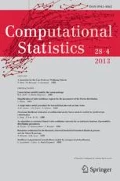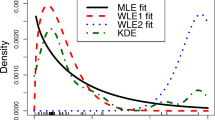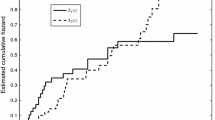Abstract
The Kaplan–Meier estimator is very popular in analysis of survival data. However, it is not easy to compute the ‘constrained’ Kaplan–Meier. Current computational method uses expectation-maximization algorithm to achieve this, but can be slow at many situations. In this note we give a recursive computational algorithm for the ‘constrained’ Kaplan–Meier estimator. The constraint is assumed given in linear estimating equations or mean functions. We also illustrate how this leads to the empirical likelihood ratio test with right censored data. Speed comparison to the EM based algorithm favours the current procedure.


Similar content being viewed by others
References
Chen K, Zhou M (2007) Computation of the empirical likelihood ratio from censored data. J Stat Comput Simul 77(12):1033–1042
Kaplan EL, Meier P (1958) Nonparametric estimation from incomplete observations. J Am Stat Assoc 53(282):457–481
Li G (1995) On nonparametric likelihood ratio estimation of survival probabilities for censored data. Stat Probab Lett 25(2):95–104
Miller R, Halpern J (1982) Regression with censored data. Biometrika 69(3):521–531
Murphy SA, van der Vaart AW (1997) Semiparametric likelihood ratio inference. The Annals of Statistics 25:1471–1509
Owen AB (1988) Empirical likelihood ratio confidence intervals for a single functional. Biometrika 75(2):237–249
Owen AB (2001) Empirical likelihood. CRC Press, Boca Raton
Pan XR, Zhou M (1999) Using one-parameter sub-family of distributions in empirical likelihood ratio with censored data. J Stat Plan Inference 75(2):379–392
R Core Team (2014) R: A language and environment for statistical computing. R Foundation for Statistical Computing, Vienna, Austria, http://www.R-project.org/
Thomas DR, Grunkemeier GL (1975) Confidence interval estimation of survival probabilities for censored data. J Am Stat Assoc 70(352):865–871
Zhou M (2005) Empirical likelihood ratio with arbitrarily censored/truncated data by em algorithm. J Comput Gr Stat 14(3):643–656
Zhou M (2010) A wilks theorem for the censored empirical likelihood of means. www.ms.uky.edu/mai/research/Note3.pdf
Zhou M, Li G (2008) Empirical likelihood analysis of the Buckley–James estimator. J Multivar Anal 99(4):649–664
Acknowledgments
Mai Zhou’s research was supported in part by US NSF Grant DMS 1007666.
Author information
Authors and Affiliations
Corresponding author
Rights and permissions
About this article
Cite this article
Zhou, M., Yang, Y. A recursive formula for the Kaplan–Meier estimator with mean constraints and its application to empirical likelihood. Comput Stat 30, 1097–1109 (2015). https://doi.org/10.1007/s00180-015-0567-9
Received:
Accepted:
Published:
Issue Date:
DOI: https://doi.org/10.1007/s00180-015-0567-9




